
by Bob Norman, Florida Trident
When Bisa Hall met fellow Florida A&M University freshman Byron Donalds on campus in 1996, she believed the future Congress member and Donald Trump vice-presidential short-lister was from another country.
“He told me he was from Jamaica and he had a Jamaican accent – and he was cute,” Hall said. “Then the next time I saw him, the Jamaican accent was gone and he said he was from New York.”
She said Donalds, who was then 18, explained why he’d initially deceived her.
“He felt like it would make him stand out,” Hall told the Florida Trident. “And he was right. There were a ton of guys from New York around, but there weren’t any guys from Jamaica. He was right, it got him noticed.”
The chameleon-like patois role-playing certainly won her attention – Hall wound up marrying him. And that first encounter has special resonance as she watches her ex-husband’s political career go places that would have seemed unfathomable during those early days.
“An opportunistic person like he is will take whatever opportunity they’re given,” said Hall, a married public school teacher and mother of two. “He was always driven to get what he didn’t have. He was trying to fill a void and get what he didn’t have.”
The 45-year-old Donalds has stood out his entire political career, initially as one of very few Black Tea Party Republicans in a sea of almost exclusively white faces, and today as a top surrogate for the Trump campaign and the MAGA movement.
Now a stalwart of the Christian Right, he was neither religious nor political during the eight years of their on-again-off-again relationship, Hall said, though he did register to vote in Tallahassee – as a Democrat.
“We never talked once about how we were going to go and vote – it wasn’t a thing,” she said. “To see him now, out there saying, ‘I’m a conservative Black man,’ and I’m like, since when? He wasn’t talking about politics at all. To see him now, it’s like, ‘When did this happen?’”
Upon first being contacted by the Trident last year, when she made the brunt of her statements, Hall reluctantly agreed to speak on the record in part, she said, because she strongly objects to Donalds’ service to Trump, a politician whom she’s disliked since well before the January 6 insurrection, civil fraud and sexual assault court rulings, multiple criminal indictments, and most recent guilty verdicts on 34 felony counts.
“I have big reactions to that man, I don’t think he’s a good human,” she said of Trump. “It’s not even political; I just think he’s a bad person.”
The congress member, who represents parts of Southwest Florida and is considered a frontrunner to be Florida’s next governor, has never been more enveloped in Trump’s orbit than he is right now. In addition to appearing on Trump’s VP list, Donalds visited the former president during his most recent trial in Manhattan, introduced him at a Black church in Detroit, handled post-debate spin room duties for the ex-president in Atlanta, and is conducting Black voter outreach for Trump with his “Congress, Cognac, and Cigars” tour of cities. During the first event in Philadelphia, he immediately stirred up controversy when he implied Black families were better off under the repressive laws of segregation than they are today.
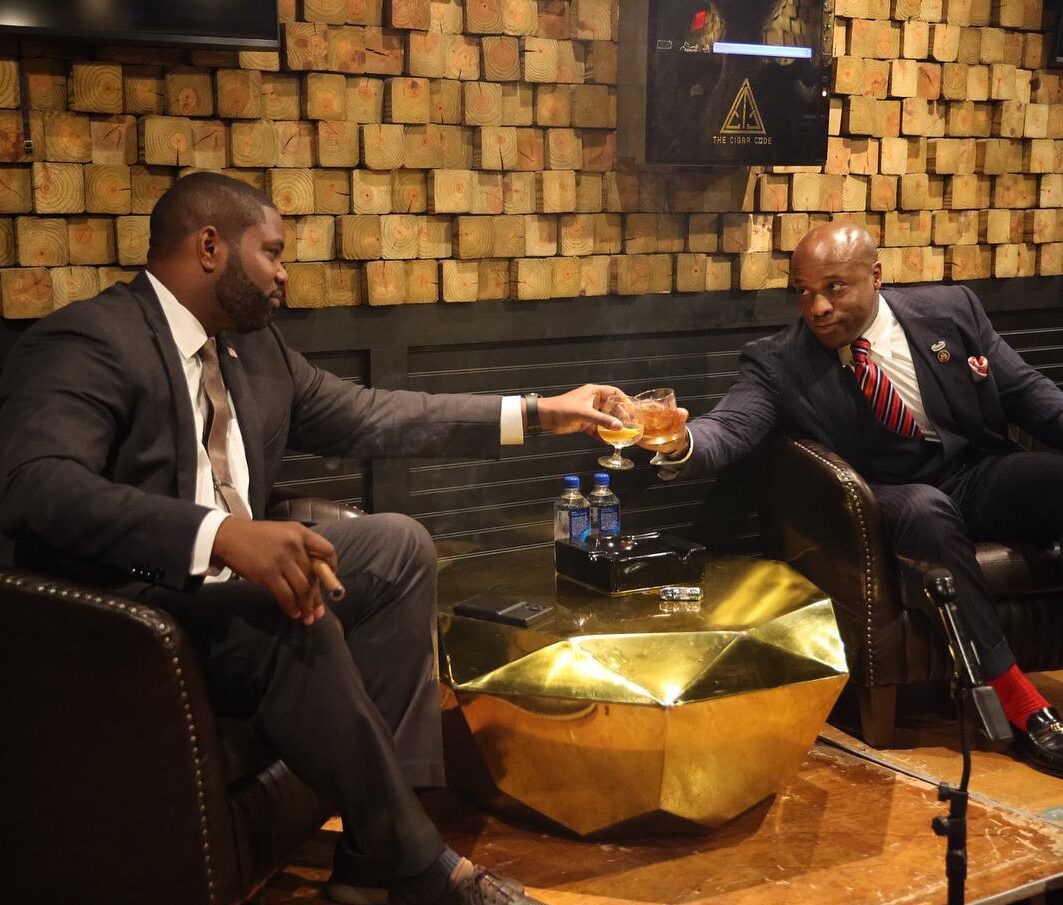
(Credit: Facebook/Byron Donalds)
“During Jim Crow, the Black family was together,” said Donalds, who is the lone Black member of the super-MAGA Freedom Caucus. “During Jim Crow, more Black people were — not just conservative, because Black people have always been conservative-minded — but more Black people voted conservatively.”
The statements permeated cable news networks and didn’t escape Hall, who simply called them “not good.”
“To see [Trump and Donalds] in collusion together, it was like, ‘If [Donalds] were a good human, would this very bad person be pushing him as a poster child?’” she asked rhetorically. “They’re both very opportunistic. You trot him out there and it makes some people feel better about Trump. I think what he’s doing is super dangerous and I think morally he and I have no crossover at all.”
Hall provides rare insight into Donalds’ college years, and her memories at times slightly differ from the Congressman’s account, particularly regarding his criminal charges for marijuana possession with intent to distribute, and bribery, as well as his dramatic conversion to evangelical Christianity.
Hall, however, made it clear to the Trident that she didn’t believe Donalds’ past scrapes with the law should be considered disqualifying.
“I’m not a fan of his, but to be fair, we all enter those phases in our lives where we make some bad choices,” she said. “He made some bad choices. I could see why he would want these things expunged. I don’t think the Byron I knew had any idea he would become the guy he is right now.”
A detailed request for comment was emailed to Donalds’ Congressional office last Wednesday, with a follow-up Friday. The Congressman, who ran into some controversy last year regarding the actions and criminal history of one of this top aides, had yet to respond to the inquiry as of press time.
“First love”
After their first meeting on the Tallahassee campus, Hall and Donalds fell for each other, she a sheltered and solidly middle-class girl who grew up the only Black girl in a white neighborhood, and he from an impoverished upbringing in the Crown Heights neighborhood of Brooklyn, raised by a single mom.
“We had so much fun together,” Hall said. “At that time he was the greatest thing ever. He didn’t have anything to give me, his family wasn’t well off, but he was my first love.”
They quickly moved in with each other and became engaged.
“He was rough around the edges,” she said. “There’s a polish there now that wasn’t there before. He would talk about how he grew up in a bad neighborhood and talk about how his family was poor. He had charm, but it was street charm.”
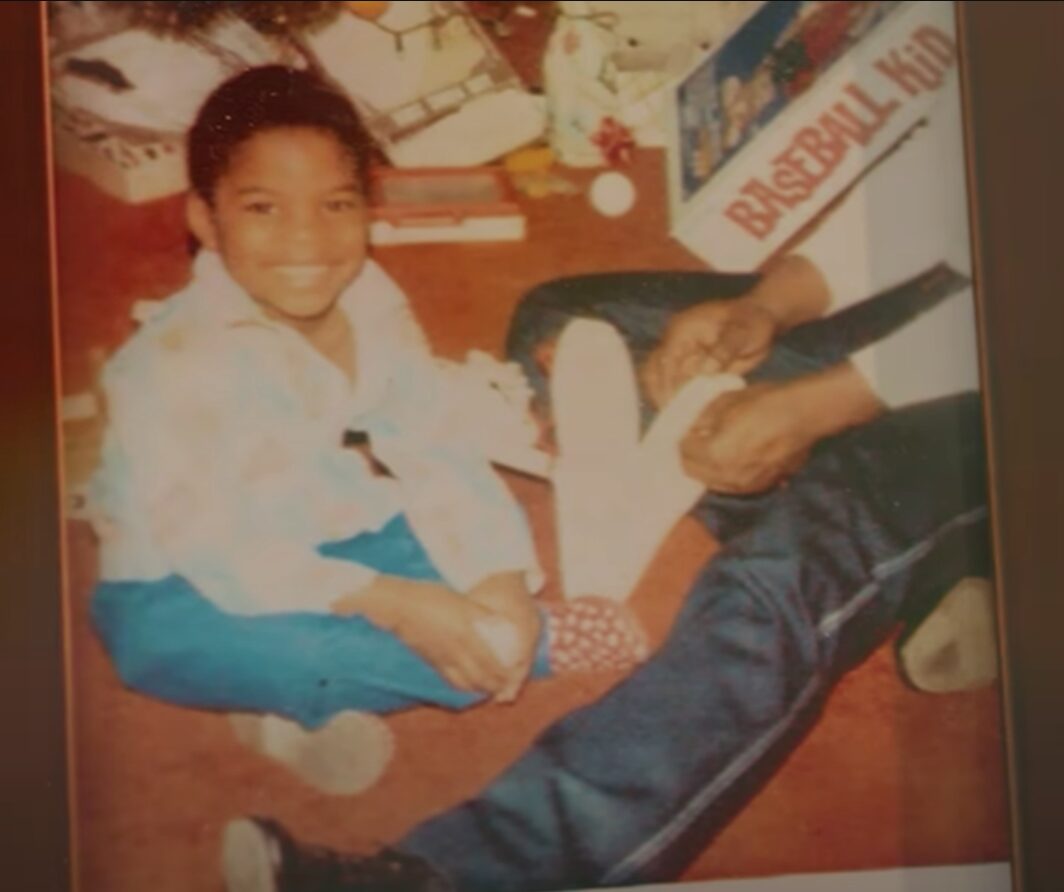
What he lacked was money, she said.
“The shininess of your relationship kind of falls off after a while,” said Hall. “You realize that person stinks sometimes and isn’t always awesome. You don’t like to pay all the bills. He was always complaining about how he didn’t have any money.”
The cash shortfall led to a serious problem – Donalds started selling weed, said Hall.
“We had this neighbor who sold drugs and they got close,” she said. “Byron thought that was his path to fix his money situation. He was making bad choices. It never made sense to me why he did it. I had a level of concern. I had to worry, ‘What if he got arrested?’”
In late 1998, just days short of his 19th birthday, it happened – Donalds was arrested for marijuana possession with intent to distribute.
A pretrial diversion program kept him from serving any jail time in the case. Donalds has claimed on multiple occasions that the arrest involved only possession, contradicting both the listed charge and Hall’s remembrance.
At around the same time, the living arrangement and engagement ended, but the pair kept a close friendship and on and off again relationship. Then, in the summer of 1999, Hall faced a crisis when her scholarship ran out and she could no longer afford out-of-state tuition.
“We didn’t get married for a romantic reason,” she said. “I had a residency issue. The easiest way to fix that was to get married to a Florida resident, and [Donalds] was a Florida resident by that time. So we got married.”
She said after they wed on June 15, 1999, they didn’t move back in together. While their personal relationship remained intermittent, the marriage would last three and a half years.
“At the time I thought maybe we should be released from this marriage,” she said. “Maybe we should get divorced. And he would say, ‘No, I don’t want to lose my wife.’ I thought, ‘Maybe he’s playing the long game here.’”
Saved at the Cracker Barrel
Donalds transferred from FAMU to Florida State University, and was arrested again, this time on a felony bribery charge.
He pleaded no contest and the charge was later expunged, leaving the details of the case unavailable, except for Donalds’ own explanation, which he provided to a Southwest Florida television station after the arrest was revealed in 2014.
“Fifteen years ago, I came into contact with a girl; she offered me a thousand dollars for my debit card and my PIN number and I gave it to her,” he said in the interview, apparently referring to a bank fraud scheme. “I never got the thousand dollars but I had to make restitution to the bank in excess of $7,000.”
Hall recalled that Donalds described it differently to her at the time.
“The way he explained it to me was that he had a job at the campus bookstore, when he was at Florida State,” she said, “and he had gotten caught stealing something from the bookstore. And then it was something along the lines of, ‘We’re going to have to let you go.’ Then he [told the bookstore], ‘I’ll give it all back and I’ll give you money if you don’t say anything.’”
Whatever the case, Donalds again was given a break by the justice system, resolving the case with no jail time or serious consequences. He’s characterized the criminal charges as youthful mistakes, and has said finding evangelical Christianity helped him get on the right path.
He told a crowd at a Faith and Freedom Coalition event that while he was waiting tables at a Cracker Barrel in Tallahassee, a woman he didn’t know approached him and told him the Lord was “calling him,” he said. He later served a “table of 12” Christian women, who were “coming from a revival,” Donalds said.
“And as they’re getting on their little bus, the Lord told me, ‘You need to go see these ladies,’” he told the crowd. “I go over to the bus, and I catch the last lady. She goes, ‘Young man, are you okay?’ And I said, ‘Ma’am, the Lord told me to stop running.’ She goes, ‘Oooh, child! Come on, sisters! Come on, sisters! We’re gonna pray over this young man right now.’ … And I gave my life to Christ on that day.”
He said the life-changing event happened in the summer of 2001, a year and a half before he and Hall divorced. She said they were still in each others’ lives at the time and she remembered him working at the Cracker Barrel, down to the brown apron with his name tag on it. But he never mentioned to her anything about joining the church.
“He wasn’t religious at all,” she said. “He was not a church person. It was not important to him. It didn’t exist.”
An abrupt divorce – and wedding
At some point Hall became aware that Donalds was dating an FSU student named Erika Lees, who hailed from the relatively upscale coastal city of Naples in Southwest Florida. While Hall knew about Erika, she said Erika had no idea that Hall was Donalds’ wife.
“He told her I was a friend and that I would pet-sit their cat,” said Hall. “So they brought the cat over – and that’s how I found out I was allergic to cats.”
The relationship was serious, but Hall said sometime around Christmas 2002, Donalds came to her with a startling proposition: He wanted to rekindle their relationship. “He said, ‘[Erika] and I have split up, and I want to give it another chance – I want my wife back,’” she recalled.
But a very short time later, after he made a trip to Naples, Donalds did another sharp u-turn, telling Hall they needed to divorce as soon as possible: “Long story short, turned out Erika was pregnant, and they had to hurry up and get married,” said Hall.
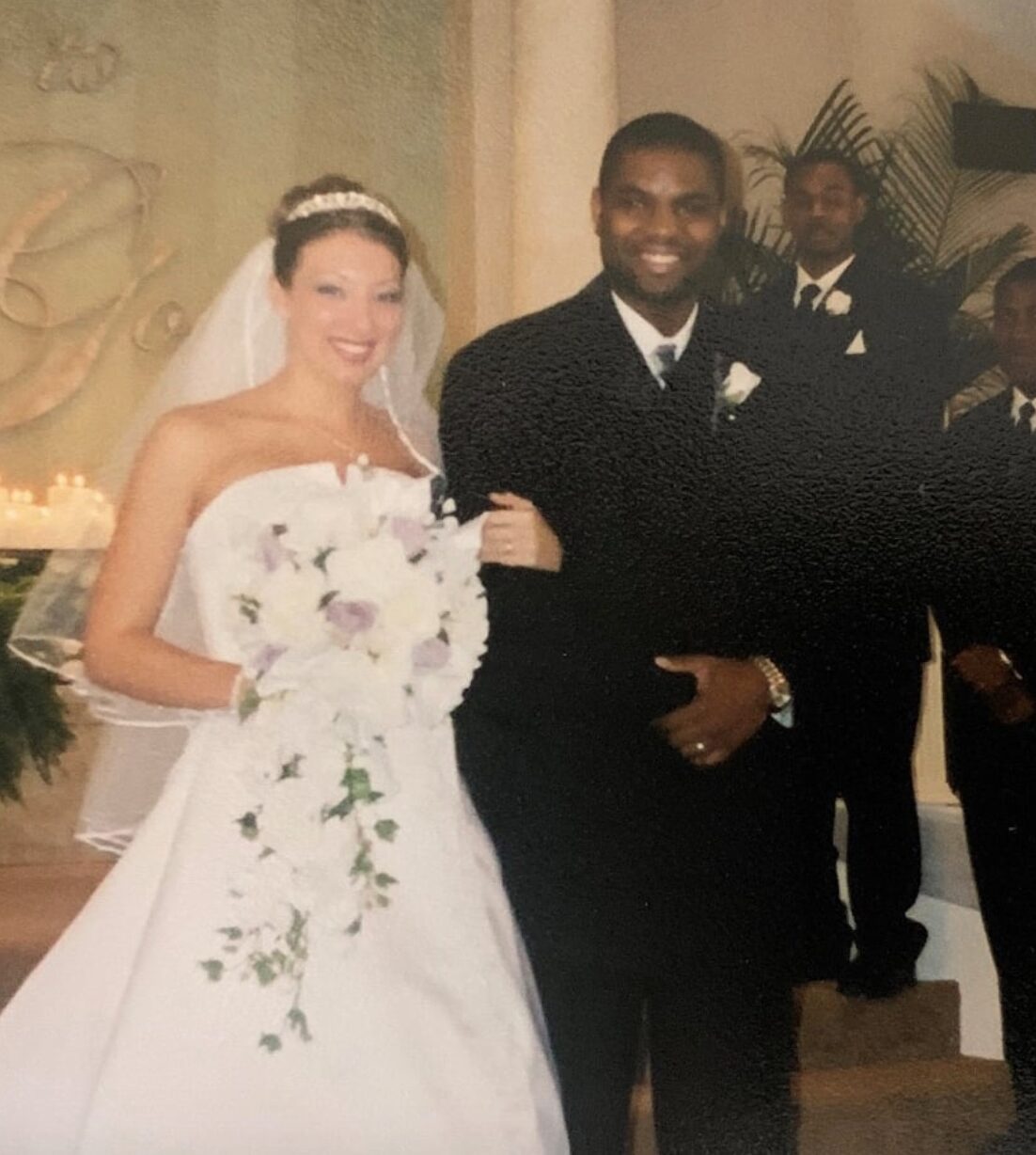
Despite the fact that she’d asked him for a divorce before, the news “blindsided” her.
“He said we have to petition to get our divorce expedited … and then he invites me to the wedding,” said Hall. “I thought it was gross.”
Donalds also asked her to pay all the fees for the divorce, which she said she did with the caveat he’d pay her back when he could afford it. It was the last transaction of what she described as a largely transactional marriage.
“We’ve been divorced for 20 years and he still hasn’t paid me back,” Hall said.
Two decades later, she’s left with a largely negative view of her first love.
“I don’t find him considerate, I don’t find him genuine,” she said. “In all these years since, you’ve changed the nature of your character? No.”
Despite those feelings, she commends her ex-husband’s decision to take responsibility for his child, especially after his own father was largely a no-show in his life.
“Being a good father was important to him,” said Hall. “He said he didn’t have a great dad, so he was going to be a good dad. He wanted to be a present dad. I respected his commitment to doing the right thing where that kid was concerned.”
Donalds married Erika on March 15, 2003, and their first of three children together was born that August.
A ‘Trump-supporting … politically incorrect Black man’
The wedding to Erika led to what seemed a fast change in fortune for Donalds.
“When he left Tallahassee, he had nothing,” Hall said. “Less than a year later, he’s living in a giant house.”
Both Donalds and his new wife worked in finance – he as a bank credit analyst, she for a New York investment management firm. Things also changed politically for Donalds – just a month after the wedding, he changed his registration to the Republican Party.
“I never talked about politics, but during my career I got passionate about it because of the financial collapse in 2008,” Donalds said during a 2023 interview. “[I] got into politics.”
He jumped headlong into the right-wing Tea Party movement, which was virulently opposed to the country’s first Black president, Barack Obama.
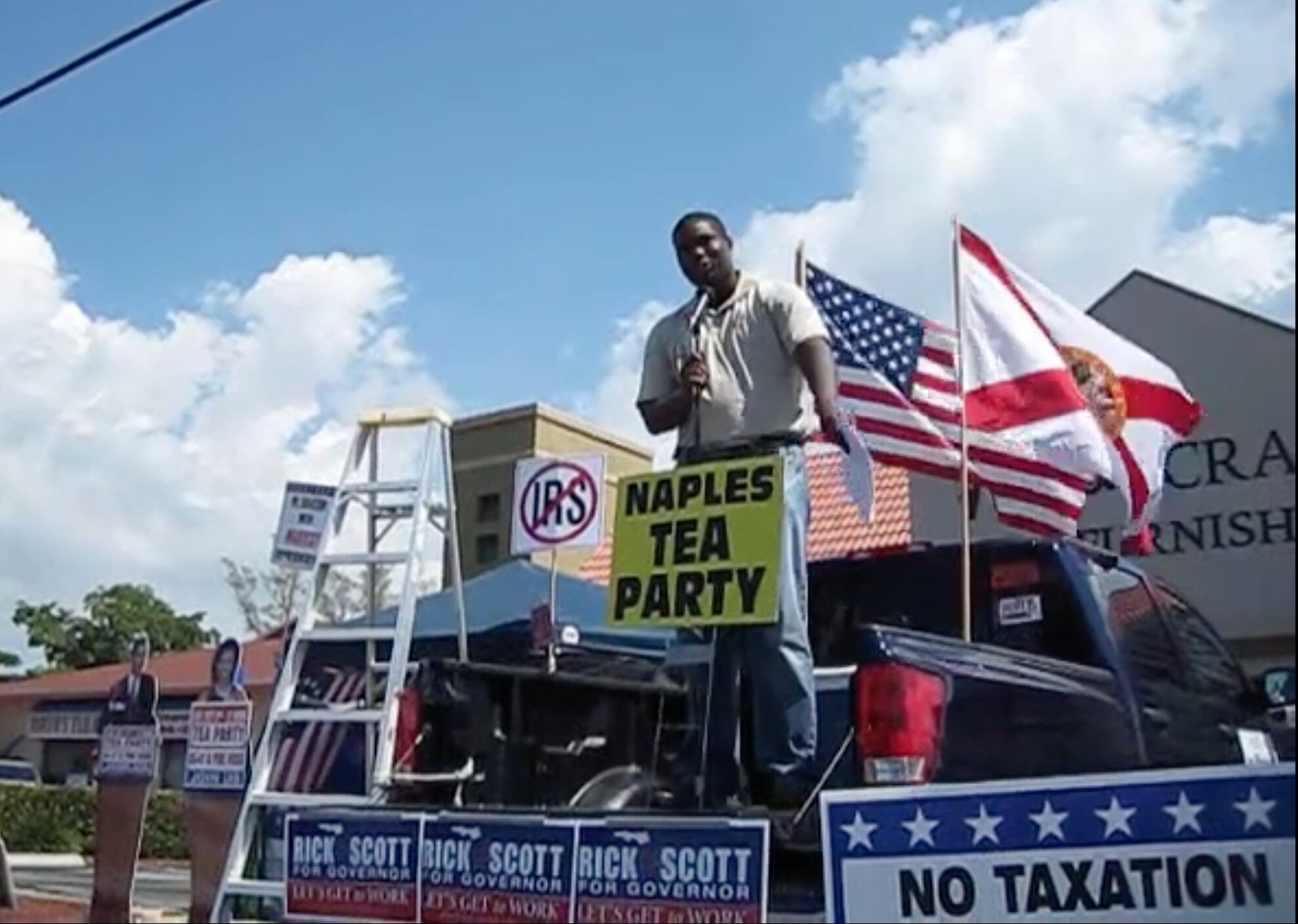
Donalds, who was then in his early 30s, began speaking at Tea Party rallies, playing to the older and almost exclusively white crowds with hard-core conservative messaging. At a rally in 2010, he gave a speech on the back of a truck with a sign reading, “No Taxation with Marxist Representation.”
“For decades now, we conservatives have been mostly quiet,” he lamented to the crowd, “while the left has been organizing and protesting in the name of social justice and equal outcomes … [that] have left us with quadrillion-dollar deficits.”
Donalds decried social programs that have assisted poor families like those in his own Crown Heights neighborhood back in Brooklyn.
“For the past 80 years, the left has been giving us deals and benefits – the New Deal, the Great Society, prescription drugs, stimulus packages, bailouts, and health care reform,” he said. “Each of these deals comes with we the people turning over more of our liberty and private property to the left in return for so-called security.”
And he addressed the wider perception about the crowd.
“The elites, they call you racists,” said Donalds. “But this election is not about blacks and whites. This election is about the future of our nation.”
A run for Congress in 2012 was unsuccessful, but after a stint in the Florida House of Representatives, he won his current Congressional seat after he ran as an acolyte of then-President Trump in 2020.
“Today, I’m everything the fake news media tells you doesn’t exist,” he said in a signature 2020 campaign ad. “A strong, Trump-supporting, gun-owning, liberty-loving, pro-life, politically incorrect Black man.”
Trump returned the favor, dubbing Donalds a “rising star” in the Republican Party – essentially making him MAGA royalty.
During his time in Congress, Donalds has repeatedly been criticized as a “prop” for Trump, whose personal history includes excluding Blacks from family-owned housing developments in New York; very publicly attacking the later-exonerated Central Park Five; aggressively pushing the false birther conspiracy theory alleging Obama was born outside the United States; and calling some of the white supremacists at a Charlottesville protest “very fine people,” among other statements widely perceived as racial dog whistles aimed at the predominantly white and rural MAGA movement.
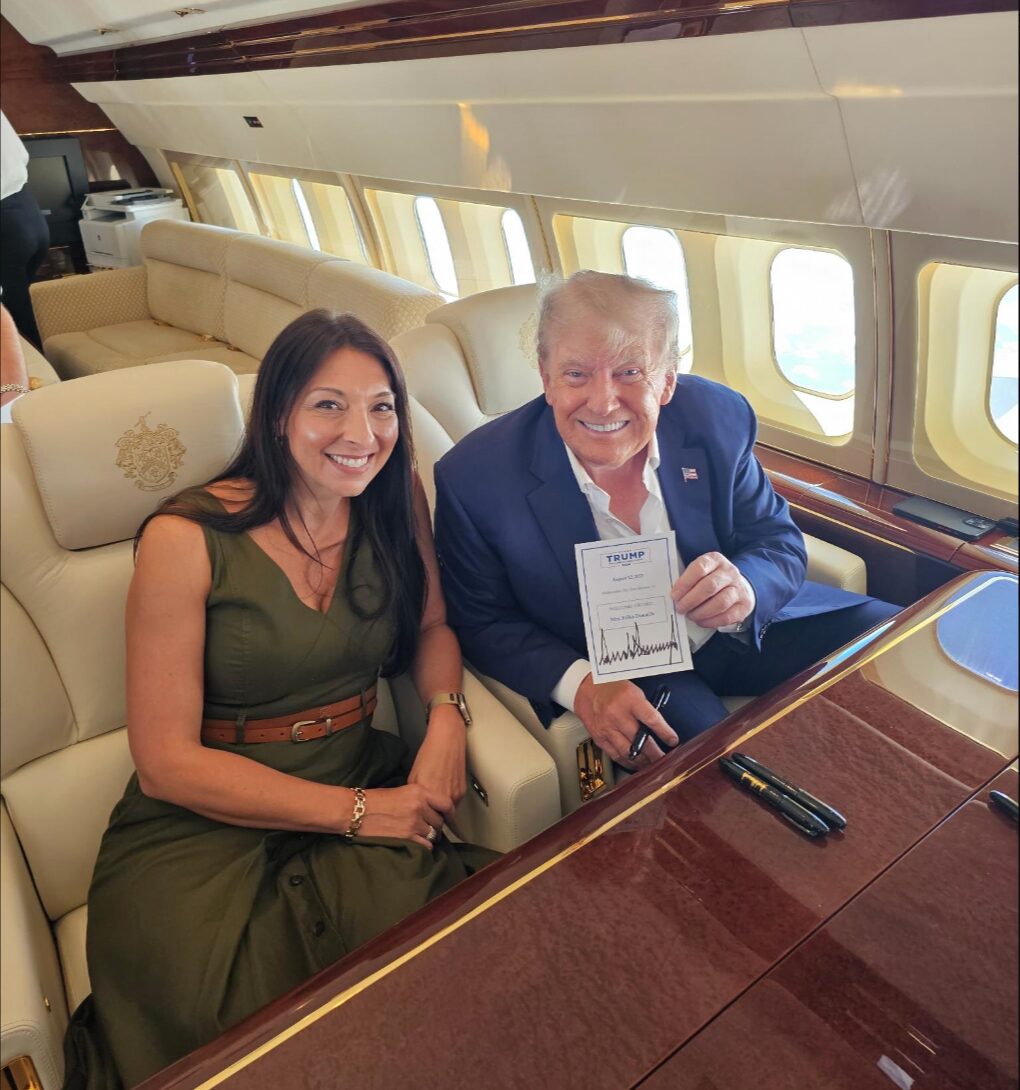
Erika Donalds, meanwhile, has been her husband’s champion and has also entered politics, serving a term as Collier County school board member that ended in 2018. While Donalds passed legislation in the Florida House to expand public funding for charter schools, Erika has made a lucrative career of managing them. She’s served as an advisory board member for the book-banning Christian conservative group Moms for Liberty and, like her husband, has been publicly praised by Trump, adding speculation she could serve as his education secretary should he be elected, according to a recent report in the New York Times about the couple’s involvement in for-profit education.
She’s certainly been a staunch defender of her husband, especially on matters of race. “They can’t accept that a free-thinking black man achieves success on his own merits,” Erika tweeted last year, “and they sure as heck can’t stand that he’s married to me! Cry harder, haters.”
When Donalds’ name was put in the running for Speaker of the House in 2023, giving him his first big burst of national attention, Democratic Congresswoman Cori Bush blasted him in a tweet: “FWIW, @ByronDonalds is not a historic candidate for Speaker. He is a prop. Despite being Black, he supports a policy agenda intent on upholding and perpetuating white supremacy. His name being in the mix is not progress – it’s pathetic.”
After the criticism, Erika appeared with her husband on Sean Hannity’s Fox News show.
“My husband is a natural-born leader, he is the future of the Republican Party,” she said, later adding, “It’s unfortunate that those on the other side, they’re the ones trying to tokenize him and say that the only reason he’s successful is the color of his skin, or because of who his wife is and the color of my skin. We all know that’s not true.”
Donalds’ work these days has been based around Trump’s political needs. The “Congress, Cognac, and Cigars” tour’s expected next stop is Milwaukee, the site of the Republican Convention later this month.
While a few other Trump vice presidential hopefuls have reportedly risen to the top of Trump’s list, Donalds remains in the mix; Trump himself said Donalds was “very high” on the list during the campaign stop in Detroit on June 15.
Donalds’ ex-wife, Hall, while recognizing the same opportunism on the political stage as she did that first time she met him nearly three decades ago, said she couldn’t find a positive in her ex-husband’s alliance with Trump and the MAGA movement.
“I don’t know, I just don’t think any of this is good at all,” she said.
This article first appeared on Florida Trident and is republished here under a Creative Commons license.
Leave a Reply










